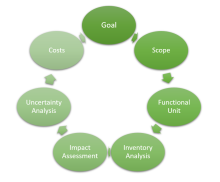Life-Cycle Analysis
Life-cycle analysis (LCA) is a term used to describe a family of calculations. In LCA, the objective is to consider the total life of a product or service. In building science, LCA is often used to quantify the impact from production through the end of life or demolition. The life-cycle cost is a way to understand the way components or features of a building may perform over the expected life of service in the building. LCA is very helpful for understanding the environmental impacts of components, and may be used to compare several options.
Life-cycle analysis based on cost, or life-cycle cost analysis (LCCA), is often used for buildings to determine the lowest cost options in a way that considers a time period of operation. LCCA often focuses on cost categories specific to buildings or building systems. These may include the purchase cost, construction cost, fuel cost, operation cost, maintenance cost, replacement cost, disposal cost, and fees associated with loans.
Curriculum
-
Remember
View SourcesSources- Define life-cycle analysis (LCA) terms, including goal, scope, functional unit, life-cycle inventory, and uncertainty analysis.
: Life-Cycle Analysis - RememberLecture Notes
: Life-Cycle Analysis - Remember - Question 1Problem Set
-
Understand
View SourcesSources- List the steps needed for a full life-cycle analysis based on the International Organization for Standardization (ISO) Standard.
: Life-Cycle Analysis - UnderstandLecture Notes
-
Apply
View SourcesSources- Interpret the results from a simple life-cycle assessment and use the data to make recommendations about a building system.
- Sketch the system boundary and flows for a life-cycle assessment.
: Life-Cycle Analysis - ApplyLecture Notes
: Life-Cycle Analysis - Apply - Question 1Problem Set
